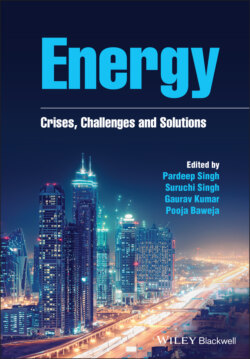Читать книгу Energy - Группа авторов - Страница 13
1.2 Energy Crisis
ОглавлениеThe energy crisis refers to the world’s rising need for energy to feed the growing population. With neither improving or reducing greenhouse gas (GHG) emissions, over‐dependence on efficiency and carbon trading has been demonstrated as a phenomenal mistake.
According to the energy industry calculations, several thousand billion tonnes of coal are currently underground and could well be adequate for a 150‐year demand at current extraction rates. Therefore, it becomes apparent that the bulk of coal reserves should stay on the ground if humans hope to avoid any climate catastrophe. In the United States, Russia, China, Australia and India, three‐quarters of the world’s coal reserves are concentrated in five countries. Therefore, human life and society’s fate depends in no small degree on the coal‐related decisions of these five major nations. Therefore, being the historical environmental polluters, the nations that are big emitters of greenhouse gases must compensate for harming developing countries by paying and promising not to burn coal and oil on the ground and keep their forests undisturbed and planting trees. To this end, a new Fund (Forest Carbon Partnership Facility, FCPF) was introduced by the World Bank in 2007, which could help achieve this goal. Providing significant rights to historical polluters implies partnership in ordinary individuals’ ongoing theft and promoting scarcity rentals to private organizations rather than harnessing them to raise public revenue. Carbon emitters should be required to pay higher prices in relation to their emissions, and trading should be permitted to open up a source of funding for the poor to be transferred. The formulation of a global carbon tax will be a feasible solution to this issue. A sustainability strategy that contributes to productivity needs to be formulated in order to achieve the wider objectives of energy protection and climate reform.
Developing such a strategy will lead to decreased carbon usage, deter the expansion of less carbon‐intensive technology and restructure revenue gradually. In all subsequent stages of the supply chain, higher input prices on carbon content, and fossil fuels will encourage higher efficiency, reducing depletion and eventually reducing pollution (Veritas 2004).
The need to obtain fossil fuels from politically turbulent or aggressive countries that have long been a cause of concern in the United States, or over‐dependence on a few selected suppliers, has been a cause of concern for the European Union in Russia. There are growing demands for energy ‘dependence’ on others and promoting renewables, which can achieve the desired goals and help combat climate change, as such conditions can be used for strategic gains (Friedman 2005). An urgent transition from traditional to renewable energy is required. It has been estimated that the United States could supply enough power to the entire United States by generating wind energy in the Dakotas and with the aid of 254 × 254 km of the Sahara desert, the world’s electricity demand could be met efficiently. Thus, desert‐rich nations should be financially encouraged to produce and export solar energy to the world. Likewise, several nations might become a tidal force, offshore wind, wave and current (Helweg‐Larsen and Bull 2007).
